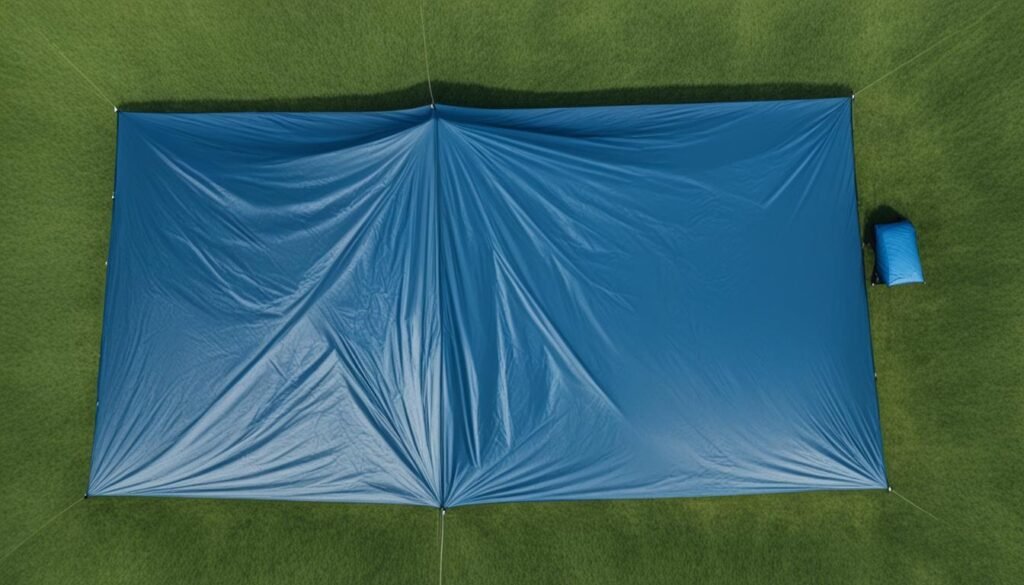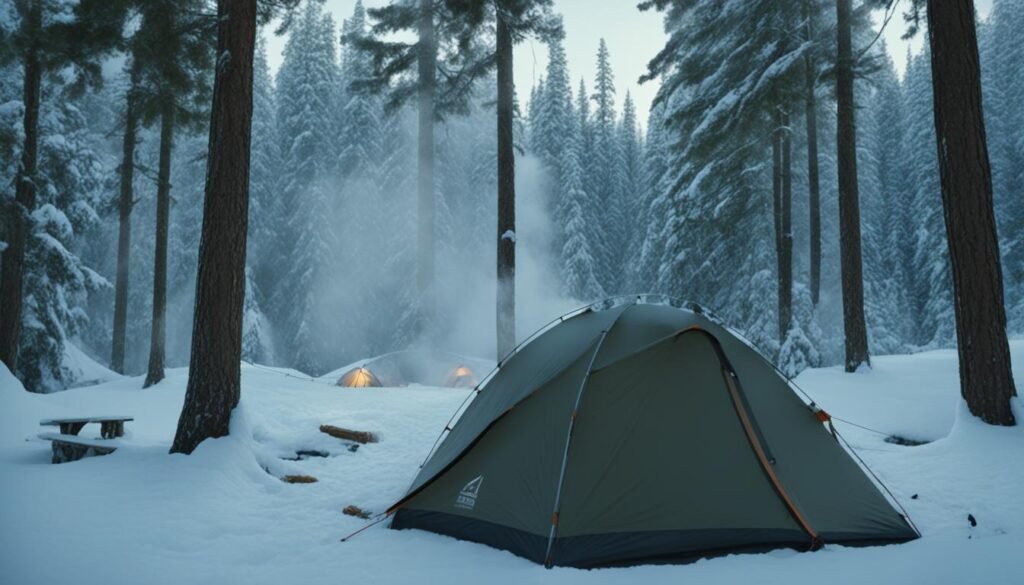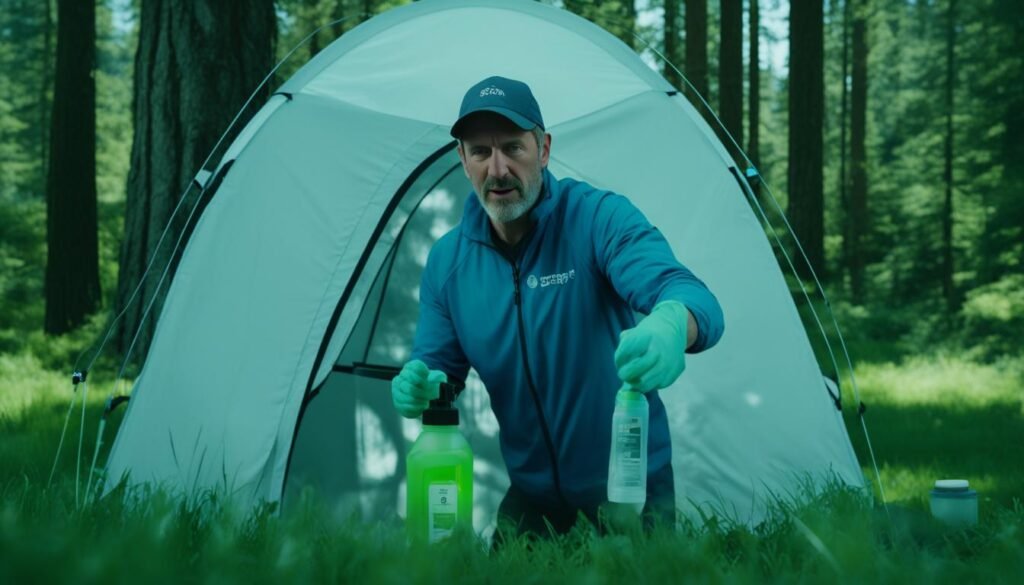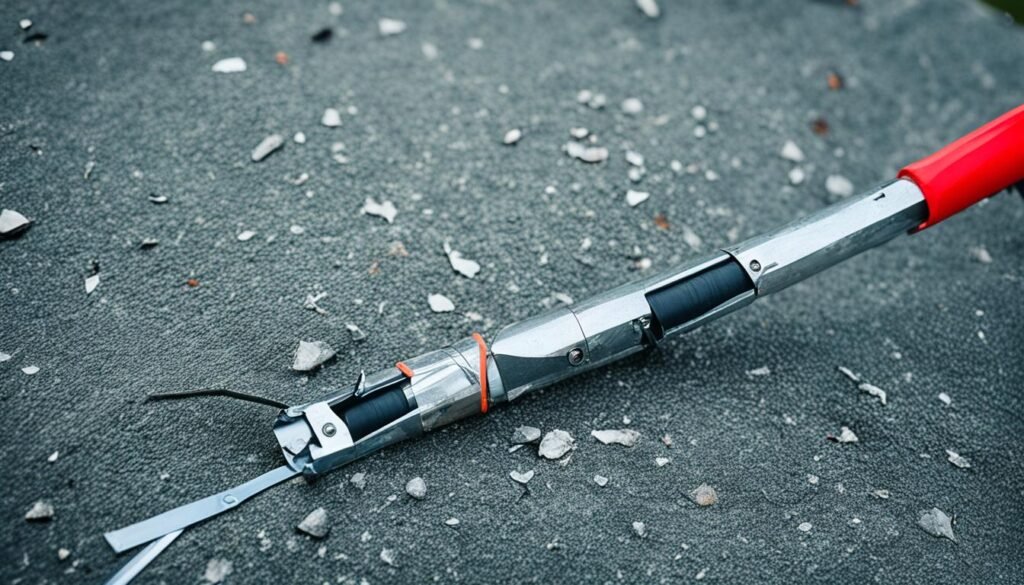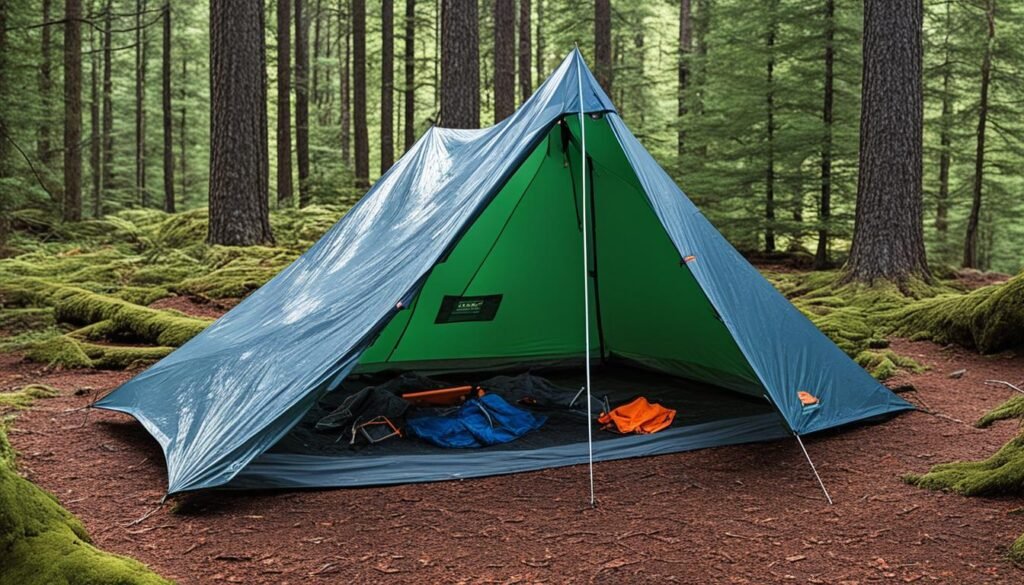Taking care of your tent is crucial to ensure its longevity and performance. By following proper cleaning techniques and storage practices, you can enjoy many more adventures in the great outdoors. In this comprehensive guide, I will walk you through step-by-step instructions for cleaning your tent, addressing common challenges, and providing valuable tips for maintaining its cleanliness. So let’s dive in and give your tent the care it deserves!
Key Takeaways:
- Regularly clean your tent to maintain its functionality and prolong its lifespan.
- Gather the necessary supplies, including water, soap, tent cleaner, cloth/sponge, and a tub.
- Spot clean dirty areas before immersing the tent in sudsy water.
- Rinse the tent thoroughly and allow it to dry completely before storing.
- Consider spot cleaning pine sap or using an enzyme cleaner for mold and mildew.
Tent Cleaning Step-by-Step
Properly cleaning your tent is crucial for maintaining its performance and extending its lifespan. By following these step-by-step instructions, you can ensure a thorough and effective cleaning process.
Gather the necessary supplies
Before you begin cleaning your tent, make sure you have the following supplies:
- Cold to lukewarm water
- Mild fragrance-free dish soap
- A cleaner designed for outdoor gear
- A nonabrasive sponge or cloth
- A bathtub or large tub
Spot clean extra-dirty areas
Start by examining your tent for any particularly dirty or stained areas. Use a sponge or cloth and a small amount of soap to gently spot clean these areas. Be careful not to scrub too hard, as this can damage the tent fabric.
Prepare the tub for soaking
Fill the bathtub or a large tub with cool to lukewarm water. Follow the instructions provided with the tent cleaner and add the recommended amount to the water. Stir the water gently to ensure the cleaner is well-distributed.
Turn the tent inside out and soak
Turn the tent inside out to expose the dirtiest side. Immerse the tent in the tub, making sure it is fully submerged. Allow the tent to soak for the recommended amount of time, typically 10-15 minutes.
Rinse thoroughly
After the soaking time is complete, remove the tent from the tub and rinse it thoroughly with clean water. Pay special attention to removing all soap residue, as leftover soap can compromise the tent’s waterproof qualities.
Dry completely
Finally, ensure the tent is completely dry before storing it. Hang the tent in a shaded area or set it up outdoors, making sure it is well-ventilated. Avoid direct sunlight, as it can damage the fabric. Allow the tent to air dry completely before folding it and packing it away.
Following these step-by-step instructions will help you effectively clean and maintain your tent, ensuring it remains in optimal condition for your next outdoor adventure.
Deep Cleaning Your Tent
When it comes to maintaining your tent’s cleanliness and prolonging its lifespan, regular cleaning is essential. While basic cleaning methods can effectively remove dirt and debris, there are instances where a deep cleaning is necessary. Deep cleaning involves tackling specific challenges such as mold and mildew, pine sap, zippers, poles, and refreshing waterproof coatings.
Cleaning Mold and Mildew
If you notice the presence of mold, mildew, or foul odors in your tent, it’s important to address them promptly. Use an enzyme cleaner specifically designed for outdoor gear, following the instructions provided. However, be cautious not to leave the tent soaking for an extended period, as it can potentially damage the waterproof coatings.
Removing Pine Sap
Pine sap can be particularly stubborn to remove from your tent fabric. To tackle this sticky challenge, spot clean the affected areas with mineral oil or consider using alcohol-based products. Gently scrub the sap with a cloth or sponge until it lifts off the fabric, restoring your tent’s cleanliness.
Cleaning Tent Zippers
Zippers are crucial components of your tent, providing access and security. Over time, dirt and debris can accumulate, hindering their smooth operation. To clean tent zippers, use a toothbrush to gently brush away trapped particles, ensuring they slide effortlessly along the zipper track.
Cleaning Tent Poles
Tent poles can also become dirty during camping trips, affecting their functionality. To clean tent poles, use a soft rag to wipe away dirt and grime. Pay close attention to the joints and connections where debris often accumulates, ensuring your tent poles remain in top condition.
Refreshing Waterproof Coatings
Over time, the waterproof coatings on your tent can wear off, compromising its ability to repel water effectively. If you notice a decrease in water resistance, consider refreshing the waterproof coatings. Follow the manufacturer’s instructions and use a suitable waterproofing spray to restore your tent’s optimal protection against the elements.
By incorporating these deep cleaning techniques into your tent maintenance routine, you can ensure that your tent remains in pristine condition and provides continued comfort and protection during your outdoor adventures.
Why You Should Clean Your Tent Regularly
Regularly cleaning your tent is crucial for several reasons. It helps preserve the tent’s material by removing accumulated dirt and particles that can cause wear and tear. Cleaning also prevents mold and mildew growth, which can weaken the fabric and compromise waterproofness. Additionally, keeping your tent clean enhances its functionality, ensures smooth zipper operation, and maintains its waterproof qualities. A clean tent adds to a more pleasant camping experience and prolongs the lifespan of your investment.
By taking the time to clean your tent, you’ll enjoy a better camping experience with a fresh and hygienic living space. Maintaining a clean tent also helps prevent the transfer of invasive species from one camping area to another, protecting the natural environment.
| Benefits of Regular Tent Cleaning |
|---|
| Preserves the tent material |
| Prevents mold and mildew growth |
| Enhances the tent’s functionality and performance |
| Maintains the tent’s waterproof qualities |
| Prolongs the lifespan of the tent |
| Improves the overall camping experience |
When to Clean Your Tent
Proper tent maintenance involves cleaning it at the right times to maintain its condition and longevity. Here are the key instances when you should clean your tent:
Cleaning After Harsh Conditions
After camping in harsh conditions such as rainstorms or sandy beaches, it’s vital to clean your tent. These conditions can leave your tent dirty and potentially damage the material if not addressed promptly.
Post Long-Term Use
If you’ve used your tent for an extended period, it’s recommended to give it a thorough cleaning. Over time, dirt and contaminants can accumulate, affecting the tent’s performance and durability.
Cleaning Before Storage
Prior to storing your tent, ensure it is clean and dry. This prevents the growth of mold and mildew during storage, which can damage the fabric and lead to unpleasant odors.
Spot Cleaning Stains
Spot clean any stains or spills as soon as possible to prevent them from setting. Prompt attention to stains can help maintain the tent’s appearance and prevent deeper cleaning requirements.
Cleaning After Spills
Accidental spills inside the tent should be addressed promptly. Wipe up the spill using a gentle soap solution and rinse to prevent stains or odors from lingering.
Addressing Odors
If your tent develops unpleasant odors, it’s essential to clean it before the odors worsen. Use a mild soap solution or a specialized tent cleaner to eliminate any lingering smells.
Pre-Trip Cleaning
Before embarking on your next camping adventure, consider performing a pre-trip cleaning. This ensures a clean and comfortable environment, making your camping experience more enjoyable.
Seasonal Cleaning
As part of routine care, clean your tent at least once a season to keep it in optimal condition. This prevents the buildup of dirt, dust, and other debris that may affect its performance.
By following these recommended cleaning practices, you can maintain the cleanliness and durability of your tent, ensuring it continues to provide a comfortable shelter during your outdoor expeditions.
Keeping Your Tent Clean & Well-Maintained in the First Place
To ensure your tent remains clean and in optimal condition, it’s important to follow preventive measures and good camping practices. By taking these simple steps, you can keep your tent fresh and ready for your next outdoor adventure.
Choose a Shady Spot
When selecting a location to pitch your tent, choose a spot that offers shade. This helps protect your tent from the sun’s harmful UV rays, which can degrade the fabric over time. Pitching your tent under a tree or in an area with natural shade will help preserve its longevity.
Ventilation and Aeration
Proper ventilation and aeration are crucial for preventing moisture buildup inside your tent. Open vents and windows to allow fresh air to circulate, reducing condensation and the risk of mold and mildew growth. This also helps keep your tent smelling fresh.
No Shoes Policy
Implementing a no shoes policy inside your tent is an effective way to keep dirt and debris out. By removing your shoes before entering, you can prevent mud, leaves, and other outdoor elements from being tracked inside, keeping your tent clean and comfortable.
Use a Footprint
Using a footprint or a tarp underneath your tent provides an additional layer of protection against moisture, sharp objects, and abrasion. It also helps keep the tent floor clean and dry, prolonging its lifespan.
Check for Sharp Objects
Before setting up your tent, inspect the area for any sharp objects that could puncture the tent floor. Clear away rocks, branches, and other debris that could potentially damage your tent. Taking this simple step will help prevent unexpected tears or holes.
Daily Brushing
To keep dirt and debris at bay, make it a habit to brush the tent floor daily. Use a soft-bristled brush or a handheld broom to sweep away any accumulated dirt or sand. This quick and easy task helps maintain a clean and comfortable living space inside your tent.
Distance from Campfire
When setting up your tent, be mindful of its distance from the campfire. Placing your tent too close to the fire can result in sparks or embers landing on the fabric, potentially causing burns or damage. Maintain a safe distance to ensure the safety of both yourself and your tent.
No Food in the Tent
Avoid storing or consuming food inside your tent to discourage wildlife from being attracted to your camping area. Keeping food outside the tent minimizes the risk of spills or lingering odors that could attract animals. This also helps maintain cleanliness and reduces the likelihood of food-related messes.
Inspect for Damage
Regularly inspect your tent for any signs of damage, such as tears, holes, or worn-out seams. Addressing these issues promptly can prevent further damage and extend the lifespan of your tent. Repair any minor damages using a tent repair kit or seek professional help for more extensive repairs.
Proper Packing and Storage
After each camping trip, take the time to pack and store your tent properly. Fold or roll the tent neatly, avoiding sharp creases that may weaken the fabric. Store the tent in a dry and cool place to prevent mold and mildew growth. Consider using a dedicated storage bag to protect your tent from dust and potential damage.
By following these tips and incorporating them into your camping routine, you can keep your tent clean, well-maintained, and ready for your next outdoor adventure.
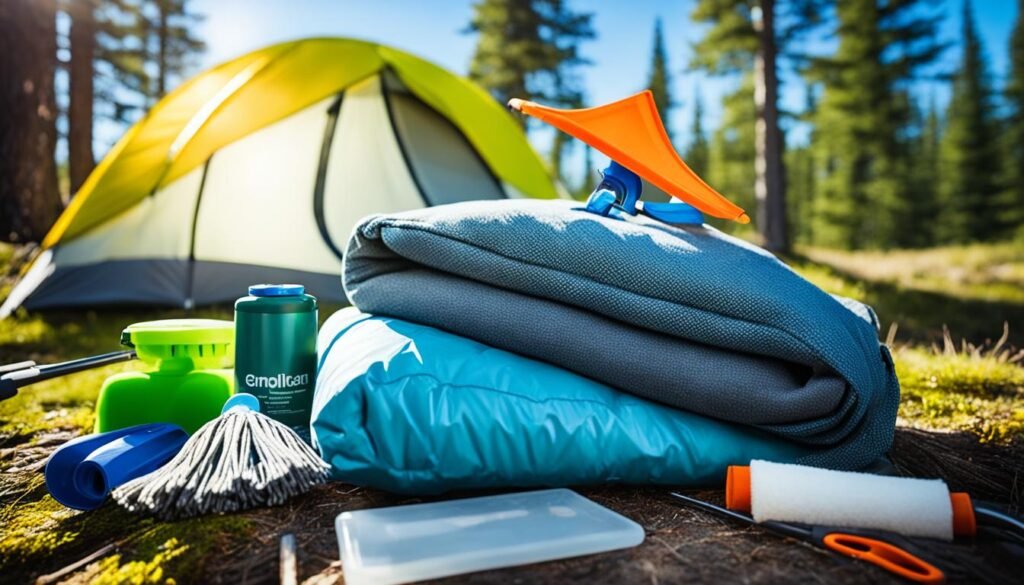
| Tips for Keeping a Tent Clean and Well-Maintained |
|---|
| Choose a shady spot to protect your tent from UV rays. |
| Ensure proper ventilation and aeration to prevent moisture buildup. |
| Implement a no shoes policy inside the tent to avoid dirt and debris. |
| Use a footprint or tarp underneath the tent to protect the bottom. |
| Check the campsite for sharp objects that could damage the tent. |
| Brush the tent floor daily to remove dirt and debris. |
| Maintain a safe distance from the campfire to prevent accidents. |
| Avoid storing food inside the tent to discourage wildlife. |
| Regularly inspect the tent for damage and make necessary repairs. |
| Properly pack and store the tent by folding or rolling, and using a storage bag. |
Tent Cleaning Materials Needed
To effectively clean your tent, you’ll need to gather the necessary materials. These items will ensure that you have everything you need to achieve a thorough and successful cleaning process:
- Mild Soap or Tent Cleaner: Choose a mild soap or a specialized tent cleaner that doesn’t contain detergent. This will help prevent any damage to the tent’s fabric and coatings.
- Nonabrasive Sponge: An nonabrasive sponge is ideal for cleaning different parts of the tent, such as the walls, floor, and rainfly. It will help remove dirt and stains without causing any harm to the tent’s surface.
- Soft Brush: A soft brush can be used for more stubborn stains or for cleaning the tent’s poles and zippers. Make sure the brush has soft bristles to avoid damaging the tent.
- Lukewarm Water: Cleaning the tent with lukewarm water is important to prevent any damage to the tent’s protective coatings. Avoid using hot water, as it can cause shrinkage or weaken the fabric.
- Large Basin or Bathtub: Having a large basin or bathtub will provide enough space to clean larger tents. It will make the cleaning process easier and more efficient.
- Seam Sealer: If your tent’s seams need resealing, make sure to have seam sealer on hand. This will ensure that the tent remains waterproof and protected from the elements.
- Waterproofing Spray: If your tent’s waterproof coating needs refreshing, use a waterproofing spray that is specifically designed for tents. This will help maintain the tent’s waterproof qualities and extend its lifespan.
By gathering these cleaning supplies for your tent, you’ll have everything you need to ensure a thorough and effective cleaning process. With the right materials, you can keep your tent in top condition for many camping adventures to come.
Essential Tips for Cleaning Your Tent
Follow these essential tips to ensure effective tent cleaning. Set up your tent in a dry, clean, and spacious area before starting the cleaning process. Use a soft-bristled brush, broom, or vacuum to sweep out debris from the inside of the tent.
When spot-cleaning stains or marks, use a damp sponge or cloth and a gentle soap if needed. Rinse the entire tent with water, starting from the top and working your way down. This helps remove any dirt or residue that may affect the tent’s performance.
Allow the tent to dry completely before packing it away to prevent the growth of mold and mildew. Ensure proper drying by hanging the tent in a well-ventilated area or using a fan. Remember that wet or damp tents are more prone to damage.
If necessary, re-waterproof the tent to maintain its water resistance. This can be done using a waterproofing spray or a seam sealer, following the manufacturer’s instructions. Refreshing the waterproof coatings helps ensure the tent remains watertight during future camping trips.
| Tent Cleaning Tips | Steps |
|---|---|
| Set up the tent | Choose a dry, clean, and spacious area. |
| Sweep out debris | Use a soft-bristled brush, broom, or vacuum to remove dirt and leaves. |
| Spot-clean stains | Dampen a sponge or cloth with a gentle soap and gently scrub the stain. |
| Rinse with water | Use a hose or container of water to thoroughly rinse the entire tent. |
| Dry the tent | Hang the tent or use a fan to ensure it is completely dry before storing. |
| Re-waterproof the tent | Apply a waterproofing spray or seam sealer as needed. |
By following these tent cleaning tips, you can maintain the cleanliness and functionality of your tent, ensuring a comfortable and enjoyable camping experience.
Proper Storage Techniques for Your Tent
Properly storing your tent is essential for its longevity. To ensure your tent remains in good condition until your next camping trip, follow these tent storage tips:
- Cleaning before storage: Before storing your tent, make sure it is clean and free of any dirt or debris. Cleaning your tent before storage helps prevent the buildup of mold and odors.
- Drying completely: After cleaning, allow your tent to dry completely. Ensure that both the tent body and rainfly are completely dry to avoid any moisture-related issues during storage.
- Folding or rolling the tent: Neatly fold or roll your tent to avoid unnecessary creases. This helps preserve the integrity of the tent fabric and reduces the risk of damage.
- Using a storage bag: Store your tent in a storage bag that is specifically designed for tents. This provides added protection against dust and potential damage.
- Storing in a cool and dry place: Find a cool and dry place to store your tent, away from direct sunlight and moisture. Exposure to extreme temperatures and moisture can degrade the fabric and compromise its performance.
By following these storage techniques, you can ensure that your tent is ready for your next camping adventure.
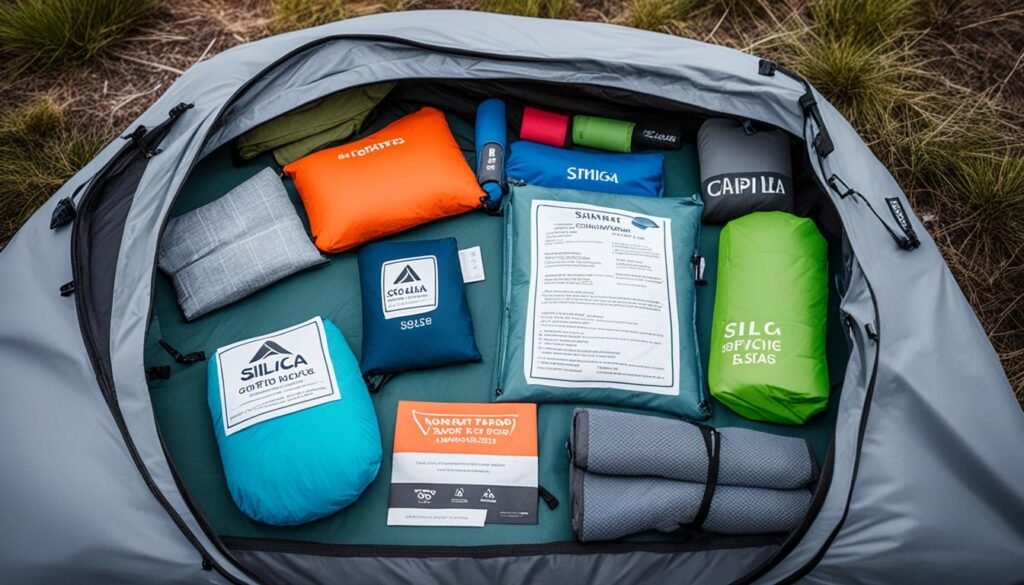
Troubleshooting Tent Cleaning Challenges
Cleaning tents can sometimes pose challenges, but with the right techniques, you can overcome them and ensure a clean and well-maintained tent. Here are some common tent cleaning challenges and how to address them:
Removing Stubborn Stains
If your tent has stubborn stains that regular cleaning methods can’t remove, try using specialized stain removers. Alternatively, you can create a paste using baking soda and water and apply it to the stained areas. Gently scrub the stains and rinse with water until the stains are gone.
Mildew Prevention
Mildew can be a common problem, especially if your tent is not thoroughly dried before storage. To prevent mildew growth, make sure your tent is completely dry before packing it away. Avoid storing it while damp as this can create a damp environment for mildew to thrive.
Addressing Zipper Issues
If you’re experiencing zipper issues, such as a zipper getting stuck or not zipping smoothly, brushing out any trapped debris can often solve the problem. Use a clean toothbrush or a small brush to remove any dirt or debris that may be causing the issue. After brushing, rinse the zipper with clean water to ensure smooth operation.
Cleaning Dirty Poles
Dirty tent poles can be cleaned with a rag or cloth. Dampen the cloth with water and gently wipe down the poles to remove dirt and grime. For stubborn stains, you can use mild soapy water. Make sure to dry the poles thoroughly before storing.
Refreshing Waterproof Coatings
If your tent’s waterproof coatings are no longer effective, you can refresh them by following the manufacturer’s instructions for applying a new coating. Some tents may require a spray-on waterproofing product, while others may need a specific type of sealant. Make sure to choose the right product for your tent and apply it according to the instructions provided.
By addressing these tent cleaning challenges, you can ensure that your tent remains clean, in good condition, and ready for your next camping adventure.
Frequently Asked Questions about Cleaning Tents
As an expert in tent cleaning, I understand that you may have some questions about maintaining the cleanliness of your tent. Below, I’ve compiled a list of frequently asked questions to help address any concerns you may have:
1. How frequently should I clean my tent?
Maintaining a clean tent is crucial for its longevity and performance. It’s recommended to clean your tent after each camping trip and perform a more thorough cleaning at least once a season to remove dirt, stains, and odors.
2. What are the best practices for cleaning a tent?
The best practices for cleaning a tent include spot cleaning stains using a mild soap or tent cleaner, rinsing thoroughly with lukewarm water, and allowing the tent to dry completely before packing it away. It’s also important to avoid using harsh chemicals, scrubbing vigorously, or machine-washing the tent, as this can damage the fabric and waterproof coatings.
3. How can I remove stubborn stains from my tent?
If you encounter stubborn stains on your tent, you can try using a paste made from baking soda and water or a specialized stain remover. Gently rub the paste or stain remover onto the affected area using a soft cloth or sponge, then rinse thoroughly with water.
4. How long does it take for a tent to dry completely?
The drying time for a tent can vary depending on various factors such as weather conditions and the size of the tent. In general, it’s best to allow your tent to air dry in a well-ventilated area for at least 24-48 hours to ensure it is completely dry before storing it.
5. How often should I waterproof my tent?
The frequency of waterproofing your tent depends on its usage and exposure to harsh elements. As a general rule of thumb, it’s recommended to refresh the waterproof coatings on your tent every 1-2 years or as needed. Keep in mind that excessive waterproofing can lead to reduced breathability, so it’s important to follow the manufacturer’s recommendations.
These frequently asked questions offer valuable insights into cleaning tents and maintaining their cleanliness. By following the best practices for tent cleaning, you can ensure that your tent remains in excellent condition, providing you with a comfortable and enjoyable camping experience for many years to come.
Conclusion
Cleaning and maintaining your tent is crucial for its longevity and functionality. By following the steps outlined in this guide and implementing regular cleaning practices, you can ensure that your tent stays clean and in good condition for many camping trips to come.
Remember to clean your tent after camping in harsh conditions to remove dirt and debris that may have accumulated. Spot clean any stains or marks promptly to prevent them from setting. Address any odors by thoroughly cleaning the tent before storing it. Additionally, make sure to properly store your tent by drying it completely and storing it in a cool and dry place.
Regular cleaning and proper care not only maintain tent cleanliness but also contribute to a better camping experience. By taking the time to clean and care for your tent, you can enjoy its functionality, prolong its lifespan, and be prepared for your next adventure in the great outdoors.
FAQ
What supplies do I need to clean my tent?
To clean your tent, you will need cold to lukewarm water, mild fragrance-free dish soap, a cleaner designed for outdoor gear, a nonabrasive sponge or cloth, and a bathtub or large tub.
How do I spot clean my tent?
Spot cleaning can be done by using soap and a cloth or sponge to clean extra-dirty areas of the tent.
How do I soak and rinse my tent?
After spot cleaning, fill a tub with cool to lukewarm water and add tent cleaner according to the instructions. Immerse the tent in the tub, allow it to soak for the recommended time, then rinse it thoroughly with clean water.
How do I dry my tent after cleaning?
To dry your tent, set it up or hang it in a shaded area and ensure it is completely dry before storing it.
How do I deep clean my tent?
For deep cleaning, use an enzyme cleaner for mold and mildew according to the instructions. Spot clean pine sap with mineral oil or alcohol-based products. Clean zippers with a toothbrush, and use a rag to remove dirt from tent poles. Consider refreshing waterproof coatings if needed.
Why is it important to clean my tent regularly?
Regular cleaning helps maintain the tent’s material, prevents mold and mildew growth, ensures functionality and performance, maintains waterproof qualities, provides a better camping experience, and prolongs the tent’s lifespan.
When should I clean my tent?
Clean your tent after camping in harsh conditions, after extended use or before storage, after spills or stains, to address odors promptly, and at least once a season as routine care.
How can I keep my tent clean and well-maintained?
Choose a shady spot to pitch your tent, provide ventilation and aeration, implement a no shoes policy, use a footprint or tarp, check the area for sharp objects, brush the tent floor daily, keep a safe distance from campfires, avoid leaving food in the tent, regularly inspect for damage, and properly pack and store the tent.
What materials do I need for tent cleaning?
Materials needed for tent cleaning include mild soap or specialized tent cleaner, a nonabrasive sponge or soft brush, lukewarm water, a large basin or bathtub, seam sealer, and waterproofing spray.
What are essential tips for cleaning a tent?
Essential tips include setting up the tent in a dry, clean, and spacious area, sweeping out debris with a soft-bristled brush or vacuum, spot cleaning stains with a damp sponge or cloth and gentle soap, rinsing the entire tent with water, allowing it to dry completely, and re-waterproofing if necessary.
How should I store my tent properly?
To store your tent properly, ensure it is clean and completely dry, fold or roll it neatly, place it in a storage bag, and store it in a cool and dry place away from direct sunlight and moisture.
How can I overcome tent cleaning challenges?
For stubborn stains, try specialized stain removers or a baking soda paste. Prevent mildew growth by ensuring your tent is completely dry before storage. Address zipper issues by brushing out trapped debris and rinsing with water. Clean dirty poles with a rag. Refresh waterproof coatings following the manufacturer’s instructions.
What are some frequently asked questions about cleaning tents?
Some frequently asked questions include the best practices for tent cleaning, maintaining tent cleanliness, removing stains, drying time, and the frequency of waterproofing.


